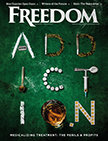How ‘Up’ Becomes ‘Down’

A child computes 2+2=5 on a test, a teacher checks it and says it’s wrong: 2+2=4. That’s a fact.
The more a statement moves away from observable, demonstrable facts like that, the less likely facts will actually be facts. At some point they become “opinion.” And then they become fables, lies and agitprop.
With the media, we have to bat around terms like nuance (a subtle difference), objective truth (the same for all people), objectivity (in journalism terms, “bias-free”), propaganda (biased or misleading information used to promote or attack a certain concept) …
… and, of course, “truth” (what I believe and what you foolishly dispute).
A hundred years ago, major cities boasted many newspapers. As broadcasting emerged, the federal government limited a single owner to a small number of stations. The marketplace of ideas was teeming—every political, social and religious persuasion was represented. Still, there was vigorous competition, and that birthed a national consensus on “that’s the way it is,” as CBS anchor Walter Cronkite would say.
After World War II, the number of media owners shrunk. Great cities had three daily newspapers, then two and then one. The Federal Communications Commission eliminated most restrictions on ownership. Today, a handful of Godzilla-scale companies control most of what you read, hear and view.
The story gets worse. Carl Bernstein, one of the Washington Post reporters who toppled Richard Nixon, wrote in 1977: “The history of the CIA’s involvement with the American press continues to be shrouded by an official policy of obfuscation and deception.” Zip forward a few decades, and Bernstein’s once revered Post is now owned by Jeff Bezos, founder of Amazon—and, not so incidentally, a guy with a $600 million cloud-computing contract with the CIA.
A half-century ago, a cult developed in journalism called “objectivity.” As fewer points of view were represented in the media, as news organizations were digested by mega-moguls, the idea was that journalists would be washed clean of bias.
It never happened. And a major contributor to decline of the media, especially daily newspapers, was a loss of credibility—readers saw through the deceit of objectivity.
But before that, just as things were steaming along nicely for media owners, a big iceberg hit the titanic news companies: the Internet. News publishers and editors had arrogated to themselves the role of information gatekeeper, and by the end of the 20th century, digital barbarians had broken through the gate and destroyed the foundation of the news monopoly.
Much of the media always had been driven by agendas—using their news outfits to tout themselves and their friends, and to trash people who stood in their way. But they needed a monolithic dominance of information to perpetuate their power, and when everyone could become a publisher, the Stalinist rule of newspapers crumbled.
And with news organizations outed as shills, it was hard to keep up the pretense of objectivity—publishers and broadcasters needed a way to respin things to their liking.
Enter the era of the so-called fact checker. And enter one of the most slanted, agenda-driven newspapers in America, the St. Petersburg Times, now called the Tampa Bay Times.
The Times in 2007 started PolitiFact—an “independent fact checking journalism web site”—and franchised it to other news outlets. Keep in mind that newspapers already had fact checkers—they’re called journalists.
There are other “fact-checking” services, none of them very good, but PolitiFact is the granddaddy—a corrupt old geezer. One fact the Times’ PolitiFact won’t adjudicate: The Poynter Institute, the ersatz “nonprofit” journalism school that owns the Times, supplies money obtained through charitable grants to PolitiFact—by all appearances using nonprofit funds to prop up the financially struggling Times. If true, that’s illegal (and you can check the facts on that).
One major service provided by outfits like PolitiFact is to ratify the bogus “truth” of propaganda. There are both Democrat-tilting and Republican-leaning fact-checking operations—examples are Conservative Fact Check on the right and Media Matters on the left. The irony and stupidity of that is obvious: If facts are conditioned by politics, then facts aren’t facts at all.
One loud opponent of PolitiFact is MSNBC’s Rachel Maddow. When U.S. Sen. Marco Rubio of Florida declared the majority of Americans are “conservative,” yet polling data shows otherwise, PolitiFact decreed in its “truth-o-meter” the claim was “mostly true.” 2+2=5.
As Maddow had to say: “PolitiFact, you are fired. You are a mess! … You are undermining the definition of the word fact in the English language by pretending to it in your name. … You are an embarrassment. You sully the reputation of anyone who cites you as an authority on fact-ishness, let alone fact. You are fired.”
John F. Sugg is an award-winning journalist who has held senior editing and writing positions at the Creative Loafing alternative newspaper group, The Miami Herald and The Atlanta Constitution. He is Freedom’s Florida-based editor.





























